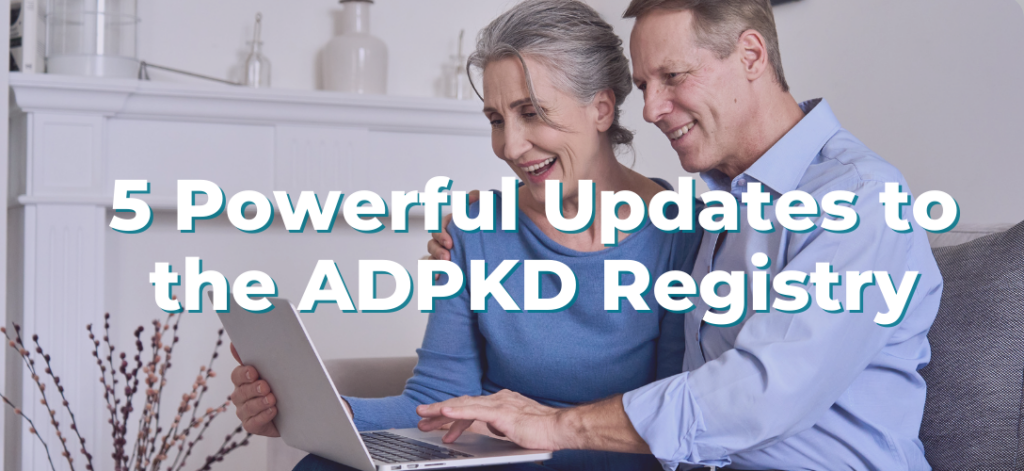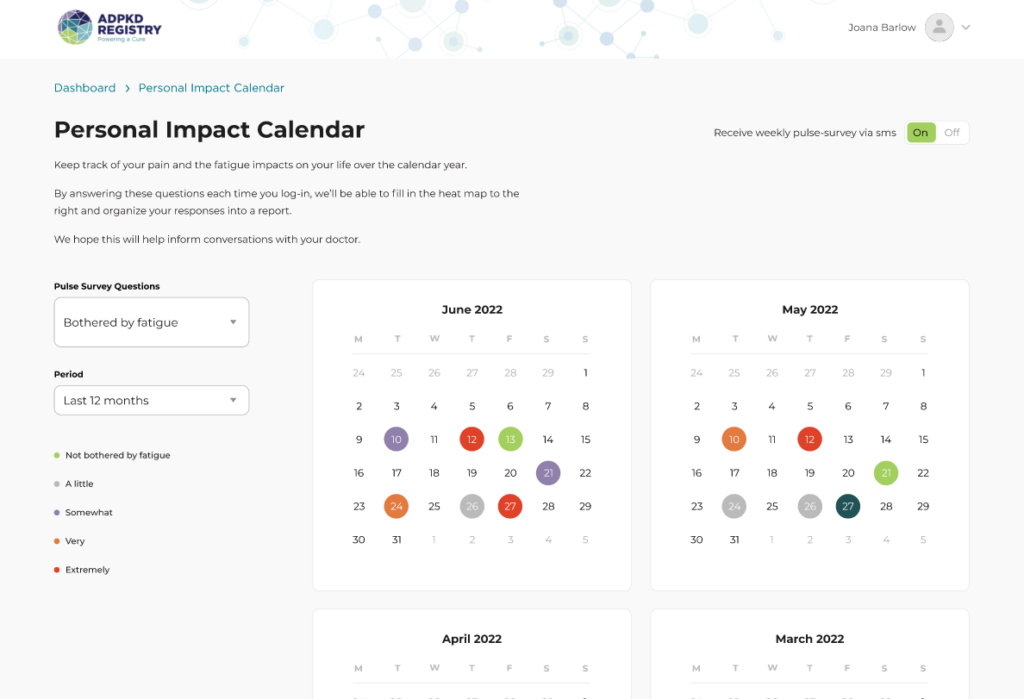
Published on August 3, 2023 | In 2019, the PKD Foundation launched the ADPKD Registry, the first national patient-centered registry for people with autosomal dominant polycystic kidney disease. Four years later, the Registry has successfully opened much-needed avenues for discussion and data exchange between patients and researchers.
Last week, the Foundation launched an updated version called PKD Registry 2.0. Here’s an overview of five enhancements adding more value to patients and researchers.
1. Link to Patient Health Records
Originally, the Registry only had patient-reported outcomes via surveys. In Registry 2.0, participating patients can choose to connect their health records to the Registry. This enables researchers to see patients’ latest labs, medications, and symptoms from their last doctor’s visit. The ADPKD Registry is one of the first patient registries to integrate patient-mediated provider health records.

“It’s helpful to be able to compare that clinical data alongside the survey data where we learn about their family history and about how PKD impacts their life. Now, researchers can learn more about what that disease progression looks like.”
—Elise Hoover, PKD Foundation Vice President of Research Programs
2. Improved User Experience
After holding several forums with participants, Registry staff heard loud and clear that parts of it were unnecessarily time-consuming. When patients were asked to update their information, they had to re-enter details that hadn’t changed much from the last time.
For example, there are 25 questions in the core questionnaire, which asks about diagnosis, latest kidney function labs, and symptoms. It takes a long time to reenter the information every year.

“We heard from many different people that that was a barrier. So, to improve their experience, we found a way to autofill past answers. We’re really excited that it’s now being offered.”
—Vanessa Holliday, PKD Foundation Research Strategist
3. Personal Impact Calendar
Holliday was also concerned about how the ADPKD Registry could help participants better understand their disease. In order to combat this, she came up with the Personal Impact Calendar. Each day, users can answer three short questions about their disease, such as pain, fatigue, and how the disease has affected their lives. After answering, various colors on the calendar reflect their answers.
“It makes the calendar interactive with the data visualization tool, where a person can select which type of calendar they’d like to see. They can look at their fatigue calendar over time and see the pattern. This not only helps the user to understand how they’ve been affected over a period of time, but they can share the information with their doctors as well,” Holliday says.

Example of the Registry 2.0 Personal Impact Calendar
4. Care Summary
Another new feature is the Care Summary, which highlights information and trends such as kidney function, family history, diet, and water consumption. “This really clear format provides background and potential conversation points with their physician,” Holliday says. “It’ll facilitate more meaningful, direct conversations at appointments when time is limited.”
5. Data Sharing Portal
Later this year, the ADPKD Registry will open up a data sharing portal for researchers. After submitting a formal request, researchers will be able to log in to a portal that shows de-identified, aggregated data based on what’s been gathered in the Registry that could potentially aid in their research process. “This tool will be extremely useful for researchers and accelerate research. Hopefully, they’ll be able to utilize this data in all different aspects of the field,” Holliday says.
She notes that this change adds value not only for researchers but for participants as well.
“Patients understand that to find a cure, participating in research is important,” Holliday says. “So, when we introduced the idea of sharing their data more widely to our patients, the response was overwhelmingly positive.”
How You Can Join the ADPKD Registry
Now that these updates are live, any ADPKD patient living in the U.S. is welcome to join the ADPKD Registry. If you’re interested in being a part of this important research tool or want more information, email pkdcure@pkdcure.org, call (816) 931-2600, or visit pkdcure.org/registry.
Want to see more articles like this? Read the full issue of our magazine, PKD Life, and subscribe to future issues here.









Soy de Ecuador mi nombre es Alexandra Escandón Bernal, mi edad es 47 años tengo poliquistosis renal y hepática, mis dificultades son grandes me han realizado dos operaciones de hígado y en la última ecografía que me realice nuevamente tengo quisted de higado hasta de 6cm y la función alterada desde antes de la segunda operación que fue en el mes de diciembre de 2022. Mis riñones están funcionando al límite me queda muy poca parenquima renal libre. Quisiera consultar ha cerca de la pruebas genéticas que hasta la fecha no me han realizado son 18 años que me detectaron la enfermedad pero en mi país la seguridad social no cubre las pruebas genéticas. Mi pregunta esta en torno si las mismas pueden ayudar a cambiar la toma de decisiones en torno a los tratamientos en últimos casos yo haría un esfuerzo económico y me las haría en un laboratorio particular. Los médicos me hablan de la posibilidad de transplante sobre todo de higado pero se detienen por la necesidad de un transplante de riñón a la par. Gracias por su respuestas.